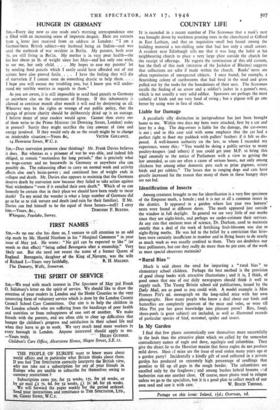COUNTRY LIFE
IT is recorded in a recent number of The Scotsman that a rook's nest was brought down by workmen pruning trees in the churchyard at Gifford in East Lothian, and that an inquisitive small boy found among the building material a ten-shilling note that had lost only a small corner. A resident near Edinburgh tells me that it was long the habit at his neighbouring church to place a very large plate outside the church for the receipt of offerings. He regrets the termination of this old custom, but the theft of this rook (imitative of the Jackdaw of Rheims) suggests that collections are safer if made within the church. Rooks' nests are often repositories of unexpected objects. I once found, for example, a flourishing colony of earthworms that had bred in the mud and grass pulled out by the rooks for the foundations of their nest. The Scotsman recalls the finding of an arrow and a soldier's jacket in a gannet's nest, which is not usually a very solid edifice. Sparrows are perhaps the most catholic of birds and are very fond of string ; but a pigeon will go one better by using wire in lieu of sticks.
Liable for Damage A peculiarly silly distinction in jurisprudence has just been brought home to me. Within two days my hens were attacked, first by a cat and later by a dog. The dog-owner is liable for the damage, the cat-owner is not ; and in this case said with some emphasis that the cat had a perfect right to floor my paddock with pullets' feather if it felt so dis- posed. A well-known authority on the law, to whom I recorded my experience, wrote this: "You would be doing a public service to many poultry-keepers (and others) if you could get your M.P. to bring this legal anomaly to the notice of Parliament with a view to getting the law amended, as cats are often a cause of serious losses, not only among chickens but among other domestic pets such as prize pigeons, aviary birds and pet rabbits." The losses due to ranging dogs and cats have greatly increased for the reason that many of them in these hungry days are not fed.
Identification of Insects Among creatures brought to me for identification is a very fine specimen of the Emperor moth, a female ; and it is not at all a common insect in the district. It appeared in a garden where last year two hornets' nests were found at different dates. The moth appeared just outside the window in full daylight. In general we see very little of our moths since they are night-birds, and perhaps we under-estimate their services. At any rate that eminent man of science, Dr. Durham, used to maintain stoutly that a deal of the work of fertilising fruit-blossom was due to night-flying moths. He was led to the belief by a conviction that hive- bees were certainly insufficient in number and in flying hours to do nearly as much work as was usually credited to them. They are doubtless our best pollinators, but can they really do more than 6o per cent. of the work as most special observers maintain?
46 Rural Bias " Much is said about the need for imparting a "rural bias" to elementary school children. Perhaps the best method is the provision of good cheap books with attractive illustrations ; and it is, I think, of good omen that one of our daily newspapers should think it well to supply such. The Young Britain school aid publications, issued by the Daily Mail, are as good as you could wish. A model example is Miss Frances Pitt's 9d. monograph on the long-tailed mice with her own photographs. How many people who know a deal about our birds and butterflies are completely ignorant of the mice and voles, or were till Miss Pitt put her great knowledge into pleasant prose! Bats, fungi, shore-pools (a great subject) are included, as well as illustrated records of particular species of bird, mammal, spider and insect.
In My Garden I find that few plants automatically sow themselves more successfully in the beds than the attractive plant which we called by the somewhat contradictory names of eagle and dove, aquilegia and columbine. They give the direct lie to the Horatian maxim that fierce eagles do not produce mild doves. Most cf mine are the issue of seed stolen many years ago at a garden party! Incidentally a kindly gift of seed collected in a private garden has produced an extremely high percentage of seedlings that promise to fill up all gaps in the rough border. The columbines are excelled only by the foxgloves ; and among bushes hybrid brooms r.-c1 barberries run one another close. Of course, most plants tend to relapse unless we go to the specialists, but it is a good plan to collect much of our






























 Previous page
Previous page